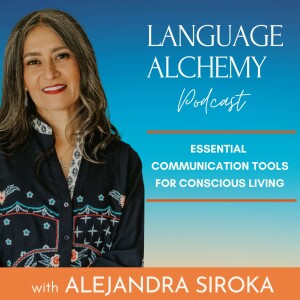
Feeling understood, heard, and respected is a universal human desire, and it's easy to be frustrated and upset with others when you aren't getting what you need. But what if the solution lies in how we express ourselves and not just in how others respond? In this episode, Alejandra reveals that much of our communication breakdown comes not from what we say, but what we leave unsaid: those emotions we tuck away, boundaries we assume rather than state, and needs we hope others will intuitively understand.
Alejandra equips listeners with practical tools for effective communication. She sheds light on how to express feelings without casting blame, how to set boundaries without sparking confrontation, and how to articulate needs in a way that promotes collaboration instead of resistance. She further underscores the importance of listening with presence and champions a blend of clarity, directness, and empathy in our interactions.
The episode encourages listeners to practice noticing when they don't feel heard, understood, or respected. By being aware of these moments, individuals can begin to identify any unexpressed needs, boundaries, feelings, or mistakes that they may have avoided communicating due to vulnerability. By working on improving their communication skills and expressing themselves more clearly and explicitly, listeners can transform their relationships and experiences, ultimately leading to more fulfilling connections.
Quotes:
• “When we look at understanding how it is that my clients feel unheard, misunderstood, and disrespected, what we often discover is that underneath these feelings, there's a pattern of communication that doesn't have to do with the other person, their family members, the people they're dating, or their co-workers. What we usually find is that it is my clients' and students' communication patterns that generate the experience of not being understood, heard, or respected.” (3:08 | Alejandra Siroka)
• “I have seen huge conflicts start, grow, and escalate to unnecessarily painful proportions because someone didn't communicate clearly, directly, or explicitly at a time when clarity, directness, and explicitness were needed.” (11:45 | Alejandra Siroka)
• “Most people think it is the other person who doesn't understand them, who doesn't listen well, or who doesn't respect them. But in many occasions, it has less to do with the other and more to do with us and what we are not communicating.” (15:29 | Alejandra Siroka)
Links
To work with Alejandra, visit: www.languagealchemy.com/workwithme
To join the Language Alchemy mailing list, visit: https://www.languagealchemy.com
To ask questions you'd like Alejandra to answer in the podcast, visit: https://www.languagealchemy.com/podcastquestion
To find out about 1:1 transformative communication coaching with Alejandra, visit: https://www.languagealchemy.com/oneonone
To find out about couple transformative communication coaching with Alejandra, visit: https://www.languagealchemy.com/couples
To schedule a reduced-rate coaching consultation with Alejandra, visit: https://www.languagealchemy.com/newclient
To follow Alejandra on instagram follow @languagealchemy
Podcast Music composed by Gary Lapow: open.spotify.com/artist/1HlMhcNfKIELxYil5mVqD
Podcast production and show notes provided by HiveCast.fm
More Episodes
 2023-09-27
2023-09-27
 107
107
 2023-09-20
2023-09-20
 110
110
 2023-09-06
2023-09-06
 115
115
 2023-08-23
2023-08-23
 131
131
 2023-07-19
2023-07-19
 131
131
 2023-06-21
2023-06-21
 117
117
 2023-06-14
2023-06-14
 104
104
 2023-06-07
2023-06-07
 110
110
 2023-05-31
2023-05-31
 116
116
 2023-05-24
2023-05-24
 99
99
Create your
podcast in
minutes
- Full-featured podcast site
- Unlimited storage and bandwidth
- Comprehensive podcast stats
- Distribute to Apple Podcasts, Spotify, and more
- Make money with your podcast
It is Free
- Privacy Policy
- Cookie Policy
- Terms of Use
- Consent Preferences
- Copyright © 2015-2024 Podbean.com





